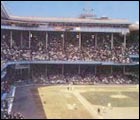| APRIL 2000 | VOL. 4, NO. 4 RELATED ARTICLES ALSO BY WILLIAMS Crazy [January 1999] RECENT ESSAY NEXT ISSUE CHRIS WILLIAMS, an announcer at a Christian radio station in Baltimore, Maryland, is a contributing writer to Renaissance Online Magazine. His short stories have appeared in Junior Trails, The Salt and the Light, Standard, and Live, among others.
FULL ISSUE CONTENTS
Connie Mack Stadium was alive, Connie Mack Stadium was a - Chris Williams | VISIT TO AN OLD FRIEND
Several Phillies were running wind sprints in the outfield. Grizzled veteran Jim Bunning was working the hardest; maybe that's why he compiled Hall-of-Fame statistics while pitching in both leagues. "Hey, Jim!" I hollered as Bunning stopped momentarily to catch his breath, "Do you think you'd have a better record if you pitched for a better team?" (The Phillies were in next-to-last place at the time.) Hands on his knees, Bunning looked up at me and responded like a congressman running for reelection. "Son, I can't answer that," he said and then took off toward centerfield. Reserve infielder and pinch hitter Rick Joseph stretched his bulky sinews near the third base coaching box. With a bead of perspiration rolling down his cheek, he glanced at the clouds that loitered over the stadium and muttered, "C'mon thundershower!" The mountainous John Mayberry walked by. He dwarfed me and my buddies, and if the sun had been out, probably would have cast a shadow on half of the lower deck. Nearby, the diminutive Larry Bowa offered quite a contrast. Playing catch with another Phillie, Bowa looked like a midget compared to Mayberry. We waited until it was almost game time to go up to the Grandstand. From my perch along the first base line, I surveyed the nearly empty ballpark. The Phillies were scheduled to move into a new arena the following Spring. Although I looked forward to the change, I also felt a tinge of sadness about the imminent demise of Connie Mack Stadium. A few rows down, an old man in a battered Phillies cap champed on a fat cigar. How did he feel? My memories went back just a few years; his probably spanned decades. Was he quietly mourning? The rain held off and the game was played. The sun even made several brief appearances; each time giving the field a sickly yellow glow. Philadelphia won 4-0. In the context of the pennant race, the outcome was meaningless. But when Deron Johnson crushed a home run up on the left field roof, the small crowd cheered like it was a World Series game. The old gentleman in the cap whooped it up as loud as anyone. For a brief moment, the Phillies played like champions and Deron Johnson was our Babe Ruth. The shell was crumbling but the heart was alive and vibrant. They tore down Connie Mack Stadium in 1976 but the place died when they closed the doors after the last game of the 1970 season. The first time I went through North Philadelphia after the demolition, I instinctively looked for the arc lights that at one time stood proud and tall. They weren't there. My mind knew the facts, but my heart didn't want to believe. A gnawing emptiness enveloped me as I realized a part of my life was gone. All that's left are the memories and for those I thank God. * * * * | ||||||||||
| PICTURES copyright © the Franklin Digital Collection. | |||||||||||

